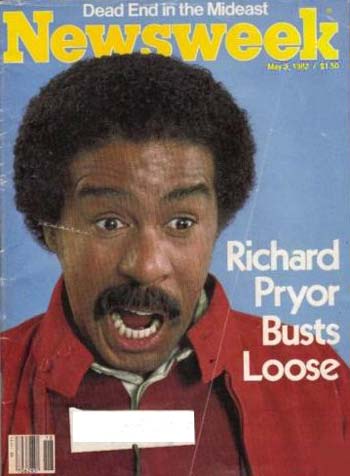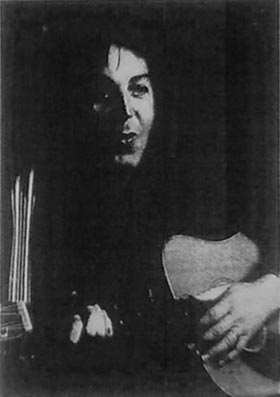 ABOUT THIS INTERVIEW:
In the spring of 1982, Paul McCartney granted a brief interview with music critic Jim Miller that would be published in the May 3rd issue of Newsweek.
With Richard Pryor on the cover, the McCartney article would appear in the Music section of the magazine.
ABOUT THIS INTERVIEW:
In the spring of 1982, Paul McCartney granted a brief interview with music critic Jim Miller that would be published in the May 3rd issue of Newsweek.
With Richard Pryor on the cover, the McCartney article would appear in the Music section of the magazine.
McCartney was in New York City promoting his latest album, "Tug Of War."
Paul is asked about the new LP, but most of the interview centers around Paul's memories of John Lennon.
In a section separated from the rest of the interview, Miller reviews McCartney's latest release as a "melancholy masterpiece," stating that "McCartney stays squarely within a finshed musical style that is unabashidly conservative -- and uniquely his own.
There is something oddly brave and defiant in that." He continues, "The over-all impression, which gathers force on repeated listenings, is of an ineffiable ache, strangely exalted in song."
- Jay Spangler, www.beatlesinterviews.org
Article ©1982 Newsweek Magazine
 Q: "What does the new album mean to you?"
Q: "What does the new album mean to you?"
PAUL: "Before we'd even started anything, I had the title, 'Tug Of War.' I wanted to do the whole album around that theme. The idea was conflict --
that everything is a tug of war."
Q: "Were you responding to criticism of your previous solo work as too shallow?"
PAUL: "Once or twice people did hit home with things. They'd ask whether I ever got fed up with writing a bit flippantly. And I said, 'Yeah, sure!'
you know. I could sit down there and literally come back in three hours' time with about a hundred of those songs -- and the terrifying thing is that ten of them might be big hits.
I had reached a point where I thought, if there is some danger of being shallow, let's not. Let's get more passion in it. So 'Tug Of War' appealed to me."
Q: "Did you ever have John Lennon in mind?"
PAUL: "No. But halfway through it, John was killed. I can't believe it to this day. But 'Here Today' is the only song specifically
about that. Obviously, 'Tug Of War' ties in... and so does 'Somebody Who Cares.' I remember being aware of John's death while writing it."
Q: "Did you see much of him before he died?"
PAUL: "I saw him quite a bit. Always, the problem was talking business. Whenever we got into business, we got into an argument. It wasn't a pleasant framework for a relationship.
When Sean (John and Yoko's son) was first born, I visited him a few times at the Dakota (Lennon's apartment house in New York). And then it had gone snotty. I used to turn up
without calling him. One time, he got annoyed with me. He said, 'Well, look, man... Why do you just keep turning up here and surprise us? Why don't you just call first?' And I
took that the wrong way. After that, I don't think I did see him. I phoned a few times. As long as we were talking about family, about life, it was good.
The last time I spoke to him, I got off the phone and it felt like old friends again. I've talked to Yoko since then, and she's said to me, 'You know,
he really was quite fond of you.' I think we were pretty close. But, sometimes, with brothers, you argue. They can be the most intense arguments, too."
Q: "Looking over some old interviews, I was struck by all the harsh things John said about you. It must have been hard to live with that kind of legacy."
PAUL: "It's tough, because I know he said all that. But with something as final as an event like that, it's funny what comes to mind. You'd expect your
memories to be the big things. Like this furious argument we were having about Apple (the Beatles' record label), really going tooth and nail. And I can
remember him looking at me, pulling down his glasses and saying softly, 'It's only me.' That's how I prefer to remember it. See, I think the big problem is that when he and Yoko
were madly in love, the rest of us Beatles didn't handle it very well. We got very uptight about stuff that wasn't offensive. If they want to go pose in the nude,
who cares? But at the time it was, 'Oh, bloody hell, look at 'em, they've gone off their rockers, these two.' It wasn't easy to cope with all that. We knew good old Johnny.
But he'd changed. Our friend was suddenly on an album cover nude, and it was just weird. I think a lot of people felt that way. 'Hey, why didn't he just stay like he was
in the Beatles? Why'd he go freaky?' I feel sorry for John and Yoko that we weren't able to be cool about the whole bloody thing. But in retrospect,
I can understand it. Hey, 'Give Peace A Chance' -- Great stuff, Man! Nude on 'Two Virgins' -- Why not! I'm not a prude, really. It's just the shock."
Q: "What parts of the Beatle experience do you remember most fondly?"
PAUL: "All of it. Mostly it's pretty fond memories because, you know, you go on a holiday, you have a real bad time... you come back, and a year later you
can only remember the good bits. For me, it tends to be the moments where John dropped his guard. Like one night we were in a hotel listening to a cassette,
I think it was 'Rubber Soul.' There were my songs and there were his songs on this side, basically. We listened through it all, and I remember him
saying to me, 'I think I probably like your stuff, if the truth was known. I probably really like your stuff.' I'm not saying he liked my stuff better than
his. It's just that for one little second there -- it was not very typical of him. He always fought for himself. He was very selfish but in a good way.
You know, looking after number one, not to the detriment of others. He was very un-that. Actually, he could be a very warm guy."
Q: "You recently told an interviewer, 'I'd always thought that, in order to be liked you had to be unwarty... I've only just realized, after
all this time, that people like to see the warts.' Thinking of John Lennon's candor about himself, I wonder... What are some of Paul McCartney's warts?"
PAUL: "Some of my warts? Oh boy... I don't particularly want to reveal them. I've got plenty. What I meant was that John could show how human
he was by vocalizing all that. It's just my character not to vocalize that kind of stuff."
Q: "After John's death, Yoko said that people mistook your real feelings because you couldn't express them very easily."
PAUL: "That's one of the things I often don't like about the way I come off. Like when John died, a reporter stuck a mic in my face and said,
'What do you think?' And I said, 'It's a drag' which of course seemed a really flippant thing to say. But later that night, I was weepin' and-a-wailin' and it all came out.
I've given up excusing myself, saying, 'I'm awfully sorry, I'm not very good at this.' Sod it. I'm not going to thrash myself. You've got to think positive."
Q: "What matters to you these days?"
PAUL: "My family, first. Music second. There isn't an awful lot else. Money doesn't really matter to me. People say, 'Aw, it's easy when you've got it,' but
Linda and I have always felt that if everything we owned disappeared, we could still head on down to Jamaica. They've got these little huts
on the beach. I'd be a gardener or a carpenter."
Q: "Do you consider yourself looking after your business affairs a hassle or a pleasure?"
PAUL: "It's not a priority, but I do take pleasure in it because, you know, I set off from the sticks to make it -- and making it as a songwriter
is one thing, and their both things I set out to do."
Q: "You're about to turn 40. How do you feel about growing older?"
PAUL: "It's nothing that really worries me. If it was just down to me, I think I would hardly notice it. Plus, with the kids, I don't
particularly want to be youthful -- I want to be a father. Being youthful, rock 'n' roll... I've done that for so long. I'm READY to move over to a
bit of maturity. I like my attitudes better. I don't sneer at stuff quite so much. I try to give it a chance, which is the thing my dad was always
trying to teach me. He would say, 'Try to understand the other person's point of view, son.' And I would say, 'Yes, dad.' 'Tolerance, son!' 'Yes, dad.'
'Moderation!' 'Yes, dad.' It wasn't as bad as that -- I'm summarizing a few years there. But now those are all big things for me. Moderation? Terrific!
Half of the people who are dead today wouldn't be if they had known that one. Tolerance? Great! I hope people show it toward me. I'm ready to
show it toward them."
Source: Transcribed by www.beatlesinterviews.org from original magazine issue
|

